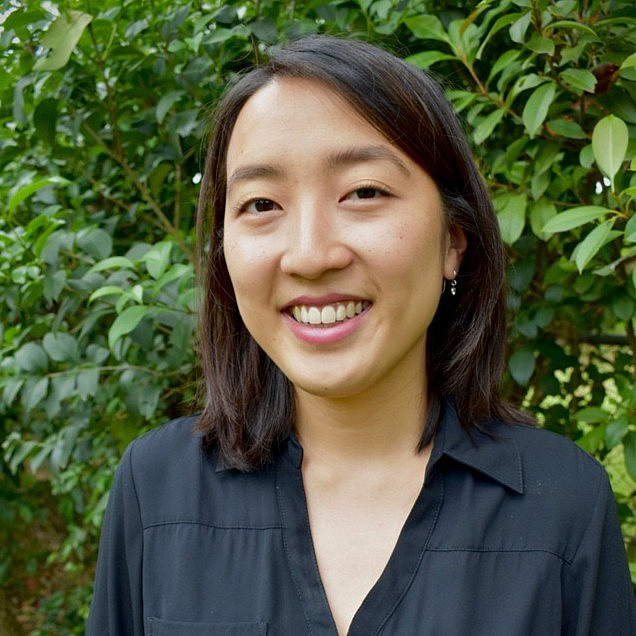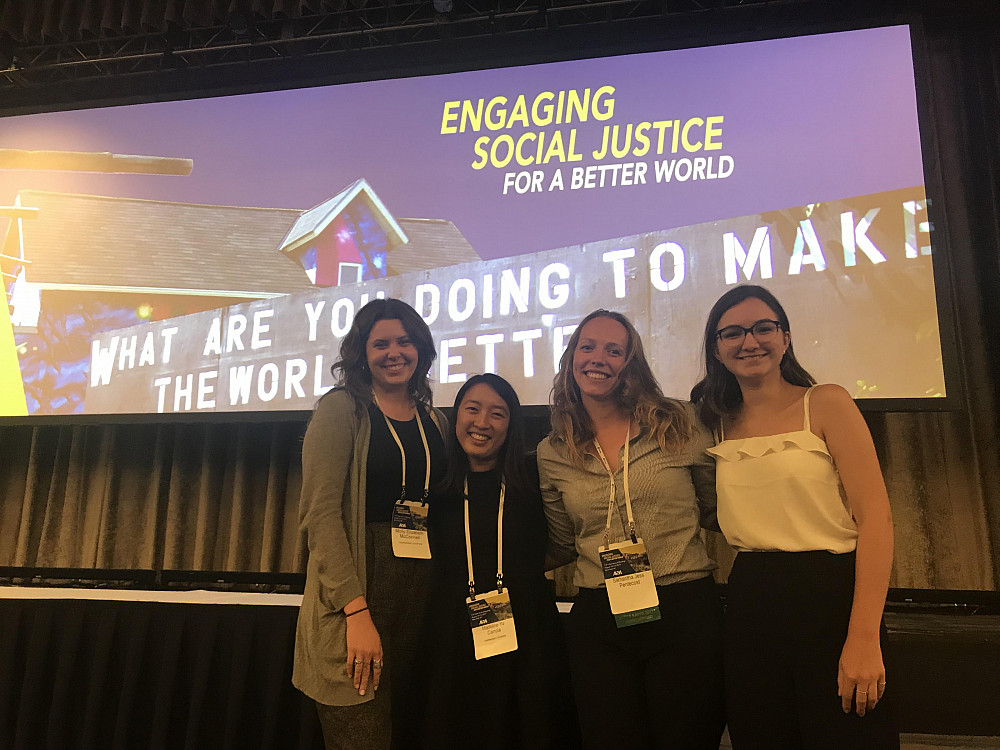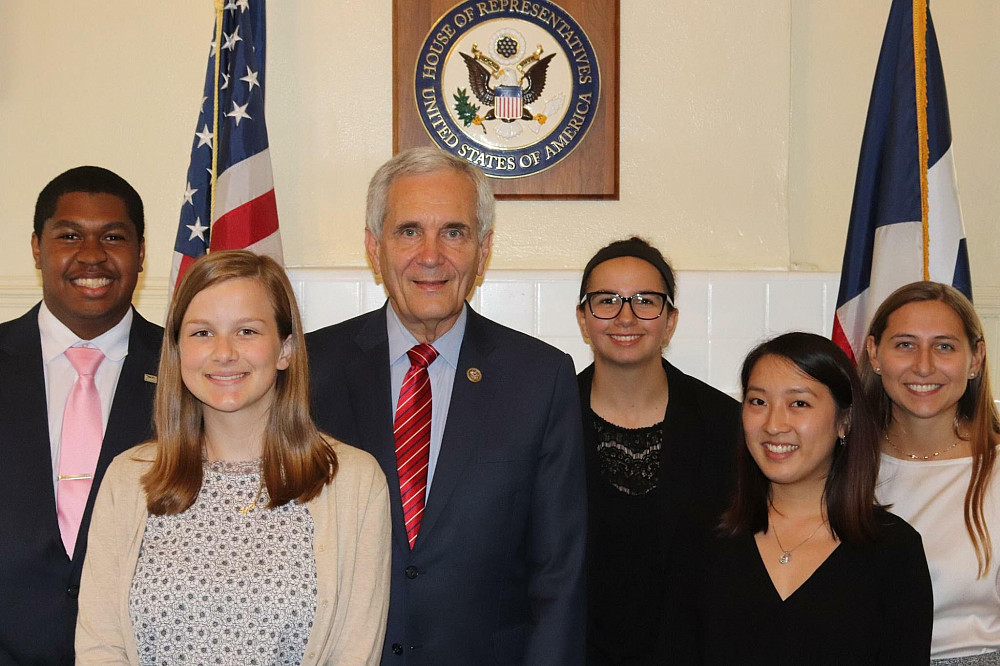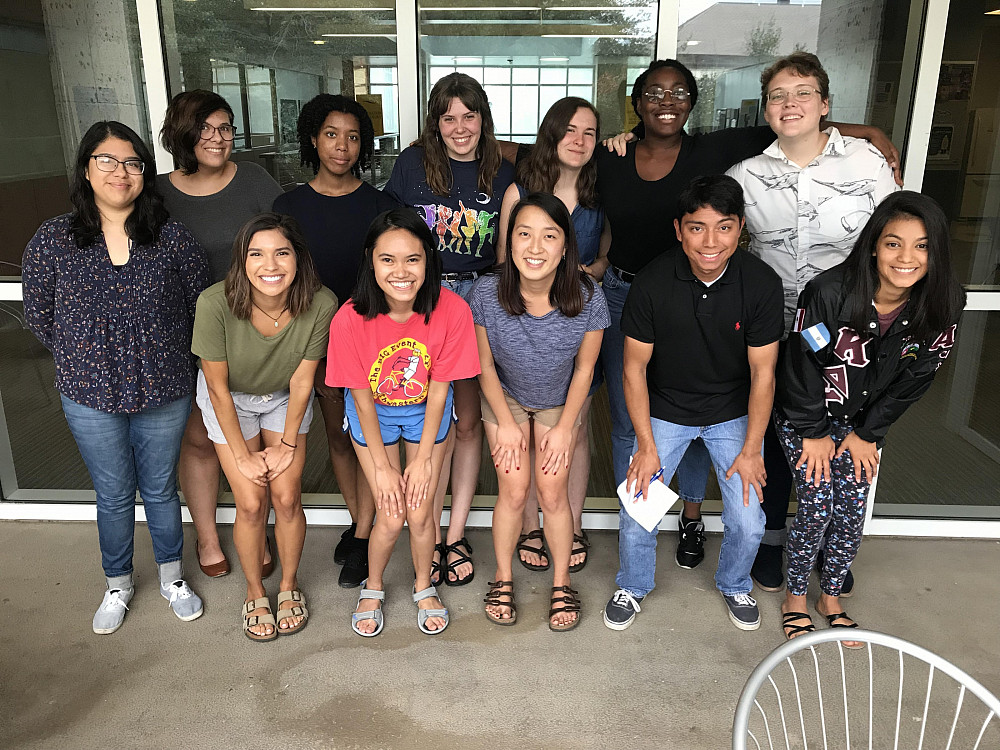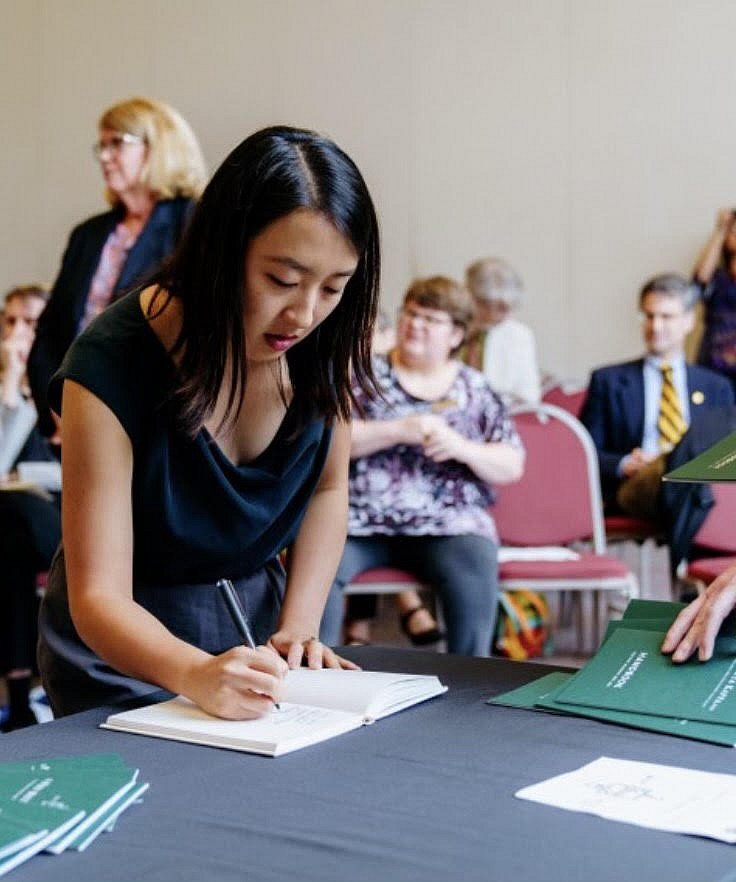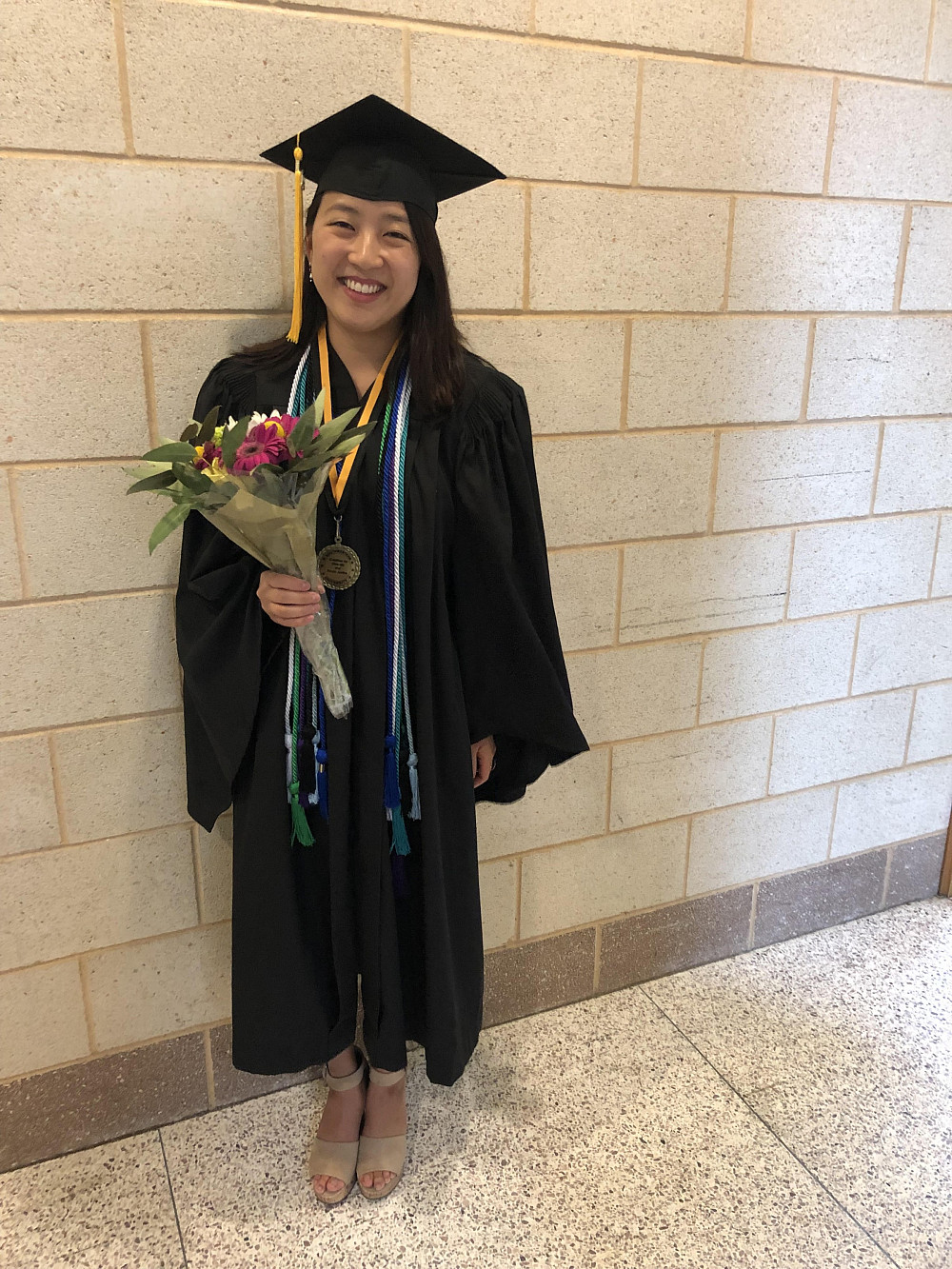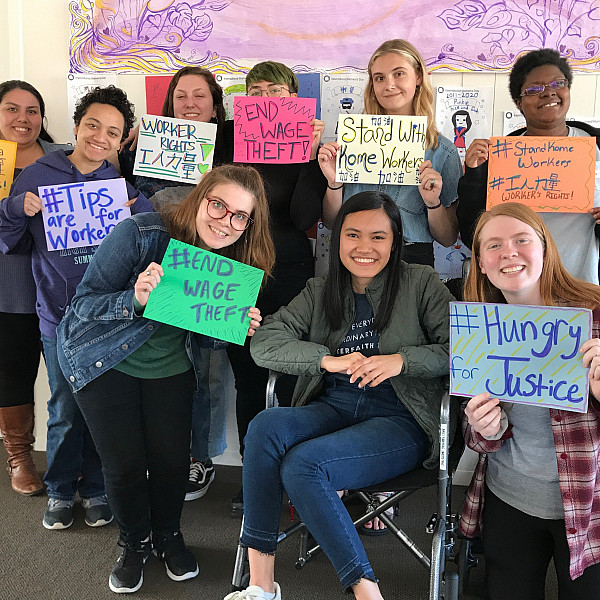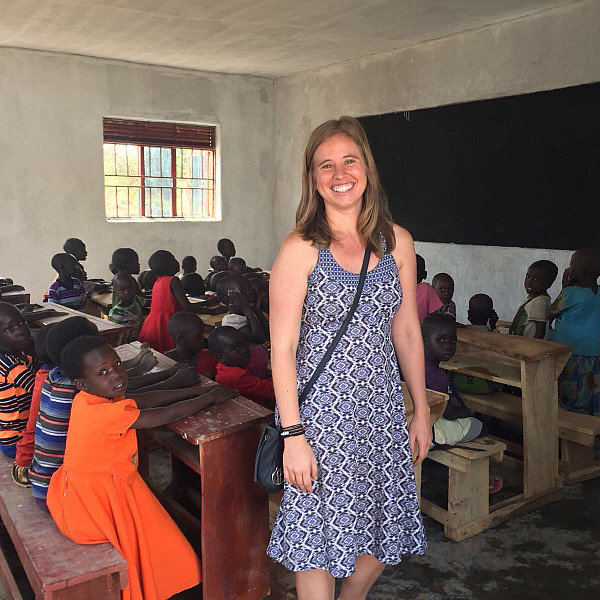News
Finding Home(s)
June 17, 2021
June 17, 2021
Even as the housing market booms across the country, the plight of individuals experiencing homelessness continues to worsen. In Texas and across the U.S., fierce debates continue: How do we prevent homelessness? Where should we allow or prohibit homeless encampments? How do we provide safe and affordable housing when demand far outstrips supply?
Madeline Carrola ’19 can speak to the complex challenges of delivering services to those who are struggling with meeting the basic human needs of food and shelter. After graduating from Southwestern, she became a workshop facilitator and resource navigator at a homeless shelter called Haven for Hope. And for the past 15 months, she has worked as a policy and planning analyst—and, more recently, a program analyst—at the South Alamo Regional Alliance for the Homeless (SARAH), an agency that secures and distributes funding to shelters and other organizations that provide direct services to individuals who are homeless. “There are different philosophies, ideologies, and approaches to ending homelessness, and it gets political at times,” she explains, “but I think making sure everybody has housing is an important goal to return to.”
A scholar of many fields
For Carrola, the path to Haven for Hope and SARAH was paved by her academic experiences at Southwestern. When she arrived at SU after graduating from the creative writing program at the Northeast School of the Arts in San Antonio, she knew she wanted to double major. She declared a feminist studies major because of how interdisciplinary and well regarded the curriculum was, and after taking Professor Sandi Nenga’s Social Problems course, she decided to also major in sociology. The entire Sociology Department—including Professor Reggie Byron and Professor Maria Lowe—became her avid supporters during her college career. “I really appreciated all their support and mentorship over the years, and I feel like I learned so much personally and professionally,” she reflects.
In 2019, Carrola was accepted into the American Sociological Association’s (ASA’s) Honors Program thanks to her capstone paper, “Performing The Handmaid’s Tale: The Use of Dystopian Literature at Political Protests,” which she researched and wrote under Lowe’s direction. For the paper, Carrola conducted ethnographic interviews with women who attended various demonstrations following the 2016 U.S. presidential election while donning the handmaid’s uniform—blood-red capes and a bonnet with white “wings”—made iconic by the critically acclaimed television series. Presenting her research at the ASA Honors Program, Carrola recalls, “was a really cool experience.” The event took place in New York City, where she traveled with Lowe, Byron, and some of her fellow SU sociology majors. She delivered her capstone paper in a roundtable discussion with students and professors from across the nation. Then, in another panel, she and Lowe presented a separate research project on neighborhood surveillance that they had been collaborating on. “It was a great experience!” she says, because she got to learn about the other presenters’ “amazing research” and engaged in “good discussions” with all the “really supportive” participants. The project additionally garnered Carrola best-paper honors at the 2019 Mid-South Sociological Association’s Undergraduate Paper Competition. This past March, a version of the paper was published in The Journal for Undergraduate Ethnography. The revision of the publication, she shares, “was a long process, but it was rewarding,” largely because it “became more than a lengthy document on my computer.” Now, it serves as a scholarly resource for students and other researchers.
Carrola says that her academic studies of political power and protest as well as social and individual behavior have certainly informed her work at Haven for Hope and SARAH.
Carrola says that her academic studies of political power and protest as well as social and individual behavior have certainly informed her work at Haven for Hope and SARAH. “Sociology helped me examine patterns and observations from a system-level perspective,” she explains. “Often, the so-called causes of homelessness are couched in terms of ‘someone can’t hold a job or can’t manage their finances,’ which oversimplifies things and neglects the ways that individuals aren’t being supported. And in focusing so heavily on the more individual factors that might contribute to someone being without a home or safe housing, I think there lies an implicit justification for someone’s experience of homelessness. I think that also contributes to the stigma associated with homelessness.” However, that narrower perspective of holding only individuals responsible for their displacement, she continues, “ignores some of the deeper-rooted structures that have caused and continue to perpetuate homelessness, like the role of racism.” Individual circumstances do matter, she adds, and providing assistance should include consideration of individuals’ backgrounds, such as the trauma they may have endured. “Social services are necessary, but the systemic causes of homelessness cannot be mitigated through social services alone,” she explains. “Sociology and feminist studies have really given me the lens and the skills to identify patterns, figure out what those patterns mean, and ask, ‘What is my role?’”
Personal and professional growth
As many alumni have echoed about their own careers, Carrola’s current work has been shaped not just by the interdisciplinary ways of thinking she learned in academic coursework but also by her many cocurricular activities at SU.
As a consultant helping peers from various majors improve their essays in the Debby Ellis Writing Center, for example, Carrola says she “grew personally and professionally—and as a writer as well”; in her current role, she does a lot of writing, such as drafting reports and communications to SARAH’s community, which is work that she enjoys. Her summer teaching fellowship with Breakthrough Central Texas, an organization that supports teens who will be first-generation college students, gave her hundreds of hours of training in providing direct services, which provided some preparation for her role at Haven for Hope. And although the governmental office where she worked during her congressional internship with U.S. Representative Lloyd Doggett was quite different from her two postgraduate workplaces, the roles have been somewhat similar because “having integrity is essential, as is doing your due diligence in responding to questions and requests for assistance.”
One of the most meaningful experiences of Carrola’s time at Southwestern was working as a student director of the Office of Diversity Education (ODE). There, she coordinated the calendar of events hosted by student groups, maintained the Cross-Cultural Center, and organized multiple events. Getting hands-on experience in office administration has been a boon in her work at Haven for Hope and SARAH, but there’s a soft spot in Carrola’s heart reserved for the ODE and Assistant Dean for Student Multicultural Affairs Terri Johnson, too. “I’ve lived in San Antonio pretty much my whole life, so when I first got to Southwestern, it was a transition period,” Carrola reflects. “I remember feeling more at ease and more at home in large part because of the ODE, spending time in the Cross-Cultural Center, and meeting Terri Johnson. The ODE was a big presence in my life and the relationships that I had there.”
“I remember feeling more at ease and more at home in large part because of the ODE, spending time in the Cross-Cultural Center, and meeting Terri Johnson.”
The ODE is also how Carrola became an active member of the Coalition for Diversity and Social Justice—“that space is so important,” she remarks—and the Reproductive Justice Alliance. “I loved the focus of it,” she says. “A lot of really great people were advocating for accountability around sexual assault on campus but then also doing education about sexual health and safe sex. That was a great constant to have during those four years.” Both organizations only broadened Carrola’s insights into the need for systemic change and furthered her interests in social justice and advocacy, which are relevant to her current work.
The postgraduate road
To learn that Carrola would feel nervous about job interviews or have an iota of insecurity about her prospects after graduation might be a surprise to some, but as many high achievers can attest, senior-year and postgrad anxiety runs high. Carrola remembers thinking, “‘Oh my gosh, the world is ending!’ even though everything was fine,” she says. She credits the Center for Career & Professional Development with building her confidence, and a Southwestern sociology alum connected her with a listserv posting nonprofit jobs, which eventually led her to the resource and workshop facilitator position at Haven for Hope. The job, she remarks, “was different from my previous experiences in many ways and something I stumbled into, but when I went to interview and met the director of that department, I could see myself there.”
Careers in human services, which also include drug and alcohol counselors, healthcare workers, court liaisons, youth advocates, and social workers, have significant ups and downs. Carrola confirms that working in direct services was often emotionally draining. She gained confidence managing their resource center, introducing voter-registration drives, and assisting others in setting up cooking classes, and helping clients prepare for interviews, apply for benefits, or look for housing. However, she encountered the many traumas experienced by those without shelter, which understandably took its emotional toll. “I would hold onto what I’d hear and see during the day,” she shares. “I’d take that home with me, and that compounds after a while… . I had to navigate setting professional boundaries.” Those 10 months were at times trying, but Carrola is deeply grateful for her time at in direct services because, she says, “I learned a lot I couldn’t have learned anywhere else, and it helped me prepare for and feel confident in the job I’m in now as well.”
Carrola’s interest in returning to the systems-level approach to social issues that she had learned at Southwestern inspired her to seek a position with SARAH, a U.S. Housing and Urban Development Continuum of Care (CoC) Program Lead Agency, which is a much smaller organization than Haven for Hope. A shift in employer meant a shift in job duties, from direct services to planning and data collection. In her first role, Carrola helped with high-level policy and planning surrounding the CoC governing bodies and their decision-making processes. Since March, she’s moved into a program analyst position, in which she will help to conduct an annual census of individuals experiencing homelessness, project-manage a grant focused on preventing and ending youth homelessness, and support organizations that connect individuals to housing and other assistance. Those are challenging responsibilities, but Carrola says that one of the most rewarding aspects of her job is collaborating with a team that is “really dedicated to making sure that everybody has a safe place to call home—I love that!”
Having such an impressive undergraduate and postgraduate résumé will significantly increase Carrola’s chances of earning a spot in a top sociology Ph.D. program and eventually become a sociology professor, which are her current career goals. “But until then, I would definitely love to stay where I am,” she says. “The work that I’m doing now has given me a lot of ideas for graduate school.”
She says she misses “the sense of community and working with other students on a common goal, whether as part of a student organization or the ODE” at Southwestern. She gets to enjoy some of that experience at her current job, of course, but she admits she feels nostalgic for the collegiate environment, where students are “just reading at crazy hours or being in the library.” She also has fond memories of her classes and professors. “I really miss having those conversations. I miss reading all of the scholarly articles,” Carrola shares. “I feel like Southwestern prepared me for both of the jobs I’ve had, though. I’m truly grateful for that.”
Carrola says she misses “the sense of community and working with other students on a common goal, whether as part of a student organization or the ODE” at Southwestern.
When Carrola chats with current Southwestern students, such as when she was a guest speaker in the Curious Conversations series hosted by the Center for Career & Professional Development, she emphasizes the importance of “leaning into different opportunities.” Especially after graduation, she shares, “I found myself in so many places that I never thought I’d be, and I think that’s just part of it all: finding yourself in new spaces and situations and just going with it.” She clarifies that being intentional about what you say yes and no to is important because focusing on the activities that truly inspire you and letting go of experiences that are not as fulfilling are all part of one’s growth and learning. “Through that process,” she adds, “you figure out where you want to be and what you want to do.”
















